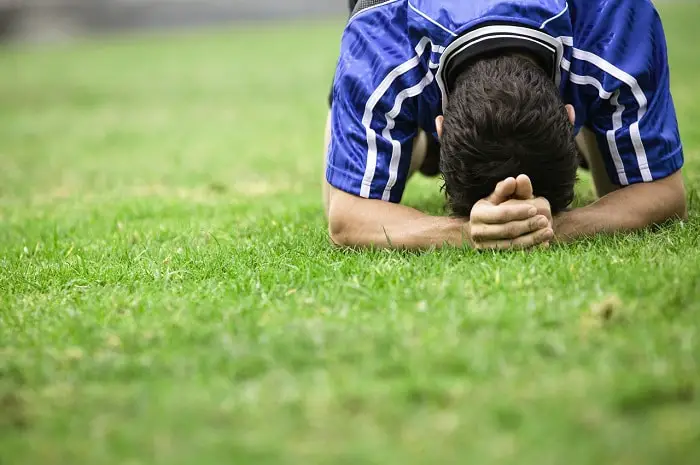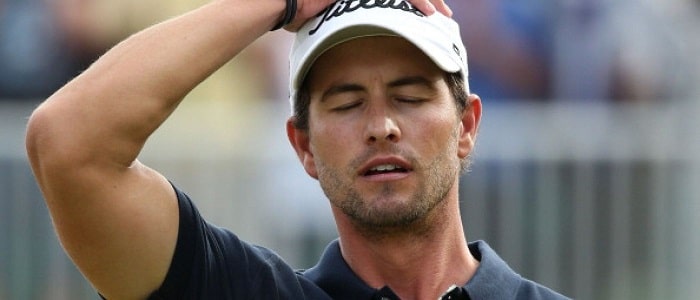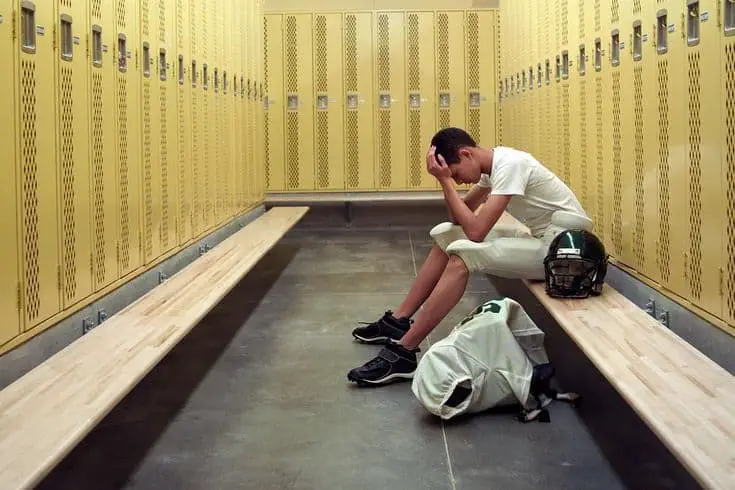Table of Contents
The fear of failure affects many athletes at different times in their careers. Fear can be an incredible emotion that drives a person to practice harder and be really determined to do well. But it can also keep athletes from performing their best. This is especially true when athletes begin to experience intense anxiety or fear of having fear!
*This post may contain affiliate links. As an Amazon Associate we earn from qualifying purchases.

What Is Fear of Failure in Athletes?
Fear of failure is essentially no different than hoping not to lose. Or, hoping to not look bad. A good example is Sam.
Sam was a high school athlete hoping to get a scholarship to play basketball in college. She had a great sophomore year with her high school team and was playing well in her summer travel league. As she began to play well she was starting to be scouted by college coaches. And this is when she recalled anxiety and fear starting to build for her. If she knew coaches from well-known programs would be scouting she noticed she began to not play her best. She said she started to really worry more about “not looking bad” rather than playing her game. Her anxiety prior to games began to increase because she feared it would be “one of those games” when she did not play her best and then she would feel awful for a few days. She wanted to work on her mental game in order to get back to “being me.”
The fear of failure that athletes experience might also be described as performance anxiety. Everyone needs a little juice or angst to perform optimally. Without this, an athlete might look flat or not fully engaged. A certain amount of eustress, also known as good stress, gets athletes ready physically and mentally.
But too much anxiety can be a problem and interfere with performance. This can be especially true if one is prone to anxiety in general. In an article written by Scott Goldman, National Collegiate Athletic Association (NCAA), he noted that one in three adolescents, just over 30%, meet the criteria for some kind of anxiety disorder. That is a staggering statistic. This means it is important to listen closely to athletes expressing their fears and concerns and help them find ways to help manage this emotion.
Fear of Failure and Performance Anxiety: Signs of Distress
Athletes having performance anxiety that is starting to get too high will oftentimes exhibit similar symptoms. These may manifest in different ways and at different times.
Regardless of that, they will almost always interfere with the athletes’ ability to perform at their best. Some of the most common symptoms of fear of failure in athletes include:
- Thoughts of “What if……… “(fill in with the bad ending)
- Breathing challenges or even hyperventilation prior to or during games
- Sweating too much or prior to playing
- Trembling
- Fatigue
- Worrying about what others think or who might be watching
- Irritability
- General anxiousness and negative outlook on chances of success
It is normal for an athlete to experience some nervousness in the time leading up to a game, but athletes having anxiety on a regular, even daily basis, and worrying about their play, possibly not sleeping well, and needing a lot of reassurance, may need some support to help them manage their anxiety. This is a time when a sport or clinical psychologist can be helpful.
Causes of the Fear of Failure in Athletes

The reasons for an athletes’ fear can come from a number of different sources. As a result, sometimes it can be difficult to know if there is one specific reason for it. Some of the common sources of fear in athletes include:
- Heavy expectations from the family
- Personal expectations of perfection
- Peer or teammate pressure
- Insecurity related to early life experiences
- A clinical condition
- A difficult coach-athlete relationship
Though you may notice that an athlete is experiencing fear of failure, it is impossible to tell what the source of that fear is by observation alone. The only way to understand some of the sources of any one athlete’s fear is to communicate with the person in a safe environment.
How to Handle Fear of Failure in Athletes
Different athletes will have different reasons for their fear. Consequently, there is no single solution for athletes. However, there are certain general approaches that can be safely taken in order to help some athletes come to understand their anxiety and better manage it. (Please note the word manage: Sometimes anxiety does not just disappear or go away, but rather, athletes can improve how they cope or manage it).
Tools for Coping with Performance Anxiety
Embracing It
One of the best ways to help an athlete overcome their fear is to help them embrace it. I can hear some of you asking why would anyone want to embrace it? Sometimes when athletes deny or try to “not have” something, it can be like a ghost lurking in the shadows. One might look for signs of it, worry that it might appear or have that fear of fear. But, by embracing it, they can learn to accept it and simply prioritize taking action. Sometimes admitting something is a problem is a path to helping find a solution. This allows them to have a plan if anxiety gets too high. Communicate with athletes that managing anxiety takes time, that skills can help but need practice and that there is no place for perfection in solving it. Let the athlete know that the fear they feel may be an indication of their drive to do well so having anxiety is not a weakness.
Understanding Process Focus
Helping athletes to focus on performing in the moment and synchronizing with their teammates to the best of their ability, can be another way to help manage anxiety. The idea is to have less focus on the success or failure and more focus on moment to moment play or execution of their sport. Part of this focus is to help athletes understand a good tool for anxiety management is to keep their focus on what they control. Worrying about what others think, who is watching and wondering if you will succeed or fail are all fuel for increasing performance anxiety.
An athlete who is thinking too far into the future won’t be able to devote full attention to the game at hand. This can keep a person from playing to their full potential. Let the athlete see that in the span of the game, all that matters is their very next move.
Showing Empathy
Athletes who struggle with fear of failure more than others will oftentimes have a sense of isolation. It is important to note that athletes who feel isolated inside may not necessarily be loners. Some athletes internalize their fears and don’t easily show or express them. As a result, they might feel alone even when surrounded by others.
If you sense that an athlete is struggling with anxiety, try to communicate with them and let them know that they are not alone. Share your own personal experiences in dealing with fear. Give the athlete examples of professionals who talked about their fears of failure, but acknowledged it, and used it to grow as a person and as an athlete. Sometimes the best strategy for helping athletes with performance anxiety is to open the door of communication, fully listen, and not try to solve it immediately. Simply show empathy and help them find a way to help themselves.

